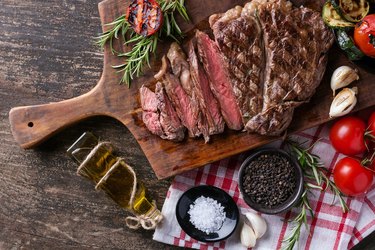
For some people, nothing beats a juicy and tender grilled steak. Many dieters prefer to shy away from red meat, however, because of studies showing an association with colorectal cancer.
But according to a literature review published in 2017 by Oncotarget, these studies included processed red meat which has been treated with chemicals to preserve freshness or additives to enhance flavor. In addition, the way meat is cooked can impact its nutritional value.
Video of the Day
Video of the Day
The steak nutrition can vary, depending on the cut you choose and whether the animal was factory-farmed and nourished with grains or whether it grazed on green pastures. But in general, an eight-ounce steak contain:
- 300 to 362 calories
- 10 to 16 grams of fat
- 40 to 45 grams of protein
- 0 grams of carbohydrates
Calories in Steak
An eight-ounce grilled sirloin steak provides about 300 calories if it;s a lean cut, and 362 calories if it's a T-bone steak trimmed to 1/8 inches of fat. A filet mignon contains 320 calories per eight-ounce serving, according to the USDA National Nutrient Database. Beef that is grass-fed typically has fewer calories than commercial beef products.
Protein, Fat and Carbohydrates
An eight-ounce steak has 45 to 50 grams of protein and 10 to 16 grams of fat. Although most people believe the fat found in steak is all saturated, that is true for approximately 40 to 50 percent.
The remainder is mostly monounsaturated fat — the same type found in olive oil and widely promoted for heart health. Fat content can be reduced by choosing lean cuts of beef.
A sirloin steak has no carbohydrates or sugar, unless it's marinated or served with a sauce containing sugar. For example, two tablespoons of barbecue sauce contain about 58 calories and 14 grams of carbohydrates, of which 12 grams are sugars.
Iron and Vitamin B12
Steak is a good source of iron and vitamin B12. Women of childbearing age require 18 milligrams of iron daily, while men need eight milligrams per day, according to the Office of Dietary Supplements.
An eight-ounce steak can help you meet your daily requirements, providing four milligrams of iron. Getting enough iron is important to prevent lethargy, fatigue and weakened immune system associated with iron-deficiency anemia. Vitamin B12 is important for the health of your nervous system and blood cells.
Deficiency of B12 can lead to fatigue, numbness or tingling, weight loss, decreased appetite and constipation. According to the National Institutes of Health, the recommended daily amount of B12 for adults is 2.4 micrograms. Steak provides more than twice that amount.
Grass-Fed vs. Grain-Fed
The animal's food can greatly influence steak nutrition. Grass-fed beef has higher omega-3 fatty acid content and provides more antioxidants, especially vitamin E, vitamin A and vitamin C compared to conventionally-raised beef. It is also free of antibiotics, hormones or drugs.
To ensure that your beef has the best nutritional value, choose grass-fed beef over traditional beef. Be careful with labels as some may indicate grass-fed although the animal ate grains during the later stage of its life. Ask for grass-fed and grass-finished beef for optimal steak nutrition.
- EatWild.org: Health Benefits of Grass-Fed Products
- USDA National Nutrient Database: Beef Sirloin
- National Institutes of Health: Iron
- Oncotarget: Red and Processed Meat Consumption and Colorectal Cancer Risk: a Systematic Review and Meta-Analysis
- USDA National Nutrient Database: Beef, short loin, t-bone steak, bone-in, separable lean only, trimmed to 1/8" fat, choice, raw
- USDA National Nutrient Database: Filet Mignon
- USDA National Nutrient Database: Sauce, barbecue